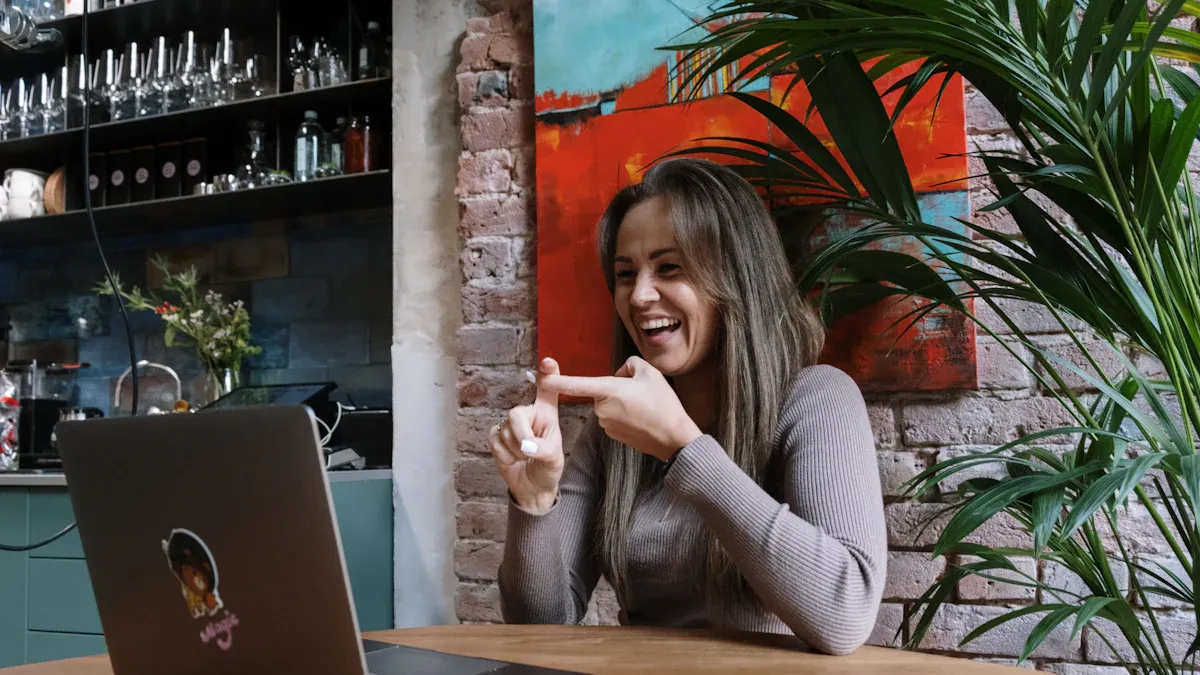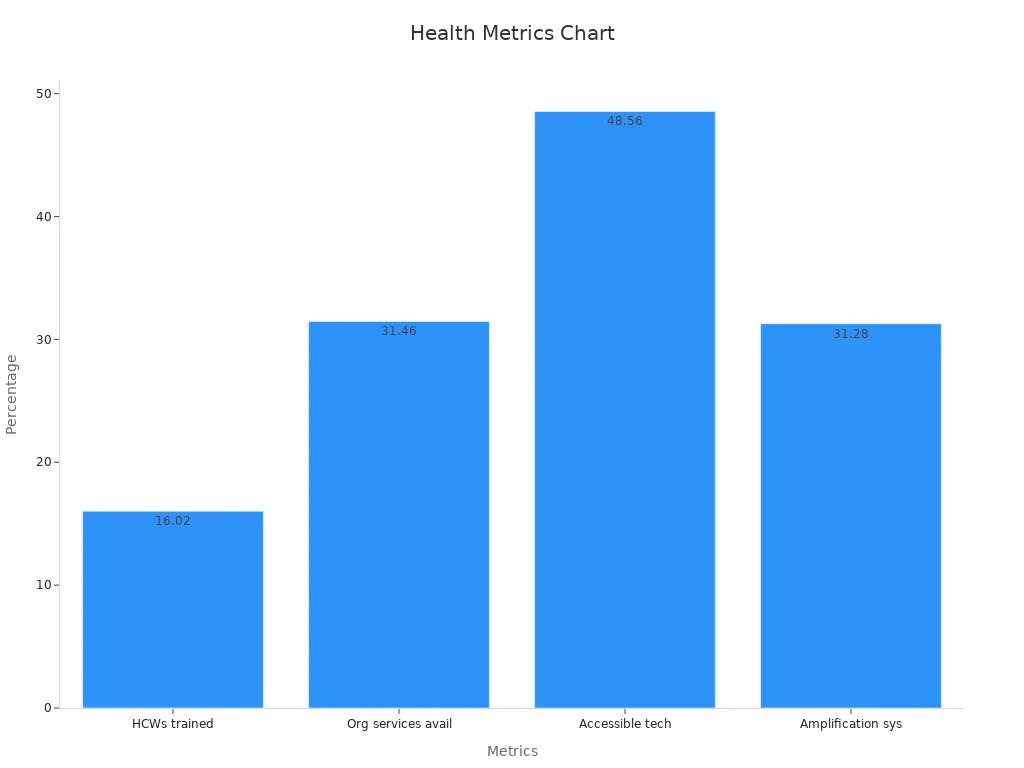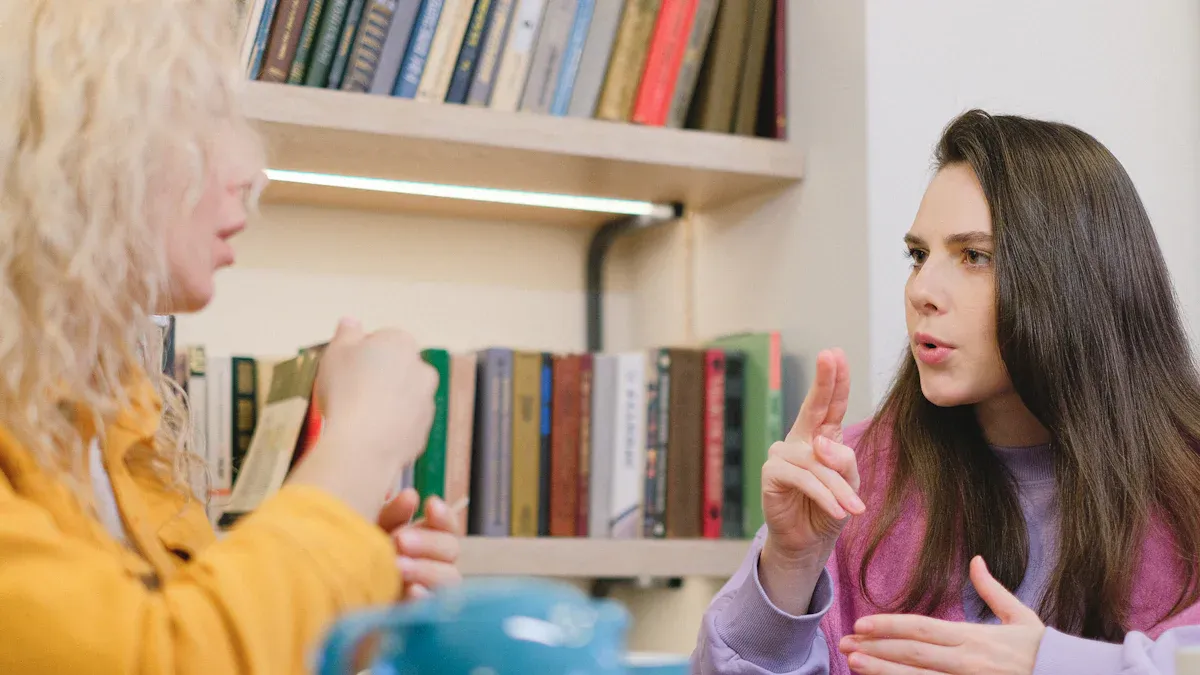
Essential Resources for Deaf Culture and Community Support
You can find important resources that support daily needs and help you connect with the deaf culture & community. Many families benefit from counseling, language classes, and guidance from Deaf mentors. Nearly all hearing parents seek counseling after discovering their child is deaf. Community centers or Deaf clubs often provide this essential support. The table below highlights how early intervention and strong ties to the deaf culture & community improve life for Deaf individuals:
| Aspect | Statistical Evidence | Impact on Quality of Life (QOL) |
|---|---|---|
| Early Detection & Intervention | School-entry screenings help kids talk and learn better | Better talking and learning at school |
| Community Support | Deaf mentors and clubs help people use language and make friends | Families feel closer and people feel less alone |
Take the next step. Explore these resources and become an active part of your local deaf culture & community.
Key Takeaways
- Local Deaf centers, peer groups, and online groups give important help. They help families meet others, learn new things, and not feel alone.
- Early help and family learning make language skills better. Deaf children do better in school when parents join in.
- Learning American Sign Language and using interpreters help people talk and understand each other. This helps at home, school, and the doctor.
- Tools like hearing devices and other aids help people hear and talk better. These tools also help people do things on their own.
- Going to Deaf culture events, workshops, and support groups makes the community stronger. It helps people and families feel more confident.
Family & Community Support

Local Deaf Centers
Local Deaf centers give helpful support to families. These places are friendly and safe for everyone. You can meet new people and learn about helpful resources. Deaf centers often have ASL classes, counseling, and workshops. Staff who know deaf culture help people feel understood. In Pennsylvania and Michigan, staff use ASL to give the right help. Colleges with Deaf center staff help students more. Deaf centers help you make friends and get answers to your questions.
Tip: Go to your state’s Deaf center or commission, like the Texas Department of Health and Human Services or the Minnesota Commission of the Deaf, DeafBlind & Hard of Hearing, to find local programs.
Peer & Parent Groups
Peer and parent groups let you talk and learn with others. Groups like Hands & Voices or MyDeafChild.org help families with Deaf children. They have meetings, workshops, and family events. Research shows joining these groups helps parents feel more sure and connected. The table below shows how peer and parent groups help:
| Evidence Aspect | Details |
|---|---|
| Study Type | Pilot study of a remote peer support intervention for Deaf parents |
| Focus | Parenting education, social support, self-efficacy |
| Session Format | Video (ASL) and chat (written English) |
| Attendance Rates | 85% to 96% (high engagement) |
| Participant Feedback | Shared experiences, learned about parenting, valued diversity |
| Outcomes | Improved collaboration and support among Deaf parents |
You can get advice and comfort from families who understand you.
Online Communities
Online communities help you connect with the deaf culture & community from anywhere. Many families join Facebook groups, forums, or apps to ask questions and share stories. These places help you learn and not feel alone. You can join online events or webinars to learn about Deaf culture and advocacy. Online communities welcome Deaf people, hard of hearing people, and their families.
Note: Online groups help you find mentors, learn about events, and make friends in the deaf culture & community.
Education & Early Intervention
Early Intervention
Early intervention helps Deaf children get a good start. You can find help from Early Hearing Detection and Intervention (EHDI) and the American Society for Deaf Children (ASDC). These programs help your child learn language and social skills early. Studies show that finding out early and getting help leads to better talking and understanding. For example:
- Auditory Verbal (AV) programs help kids learn to listen and talk. In one study, 79% of kids reached the right level for their age.
- Early help works best when parents join in and help.
- Kids found to be Deaf before 7 months do better with language and friends.
- Seeing audiologists and therapists often helps track your child’s progress.
| Intervention Type | Outcome Summary |
|---|---|
| Sign language support | Helps kids learn more words and use sign language |
| Auditory Verbal therapy | Helps kids using hearing devices grow their language skills |
| Early intervention at specialized centers | Kids can learn language like hearing kids |
| Family counseling and home training | Helps families talk and get along better |
School Support
You can help your child do well in school by working with teachers and helpers. Many schools have Individualized Education Programs (IEPs) and help from the National Deaf Center or RIT/NTID Outreach. Studies show Deaf students in sign bilingual classes do as well as hearing students. Using sign language in class helps students understand and join in. Bilingual classes, with sign and spoken language, help with reading, math, and making friends. Interpreters and pictures in class also make learning easier.
Tip: Meet with your child’s school team often to check goals and make sure your child gets the help they need.
Family Education
Family education programs teach you how to help and speak up for your child. Parent groups and training from EHDI Family Based Organizations help you feel more sure and skilled. You can learn American Sign Language (ASL) together with family lessons. Studies show parents in these programs feel stronger and more connected. Programs like “ASL at Home” help all families learn useful ASL and about Deaf culture. When you go to family events and workshops, you get tools to help your child do well.
Note: Family education helps you learn to stand up for your child and meet other families for support.
Communication & Language Access
ASL Learning
Learning American Sign Language helps you talk in new ways. ASL classes teach you how to use your hands to talk. Many people who take ASL classes use more hand signs. A study showed 75% of students used their hands more after one year. This helps you remember things and understand space better. You can find ASL classes at Deaf centers, colleges, or online. Some programs, like “ASL at Home,” let families learn together.
Tip: Practice ASL with Deaf mentors or in groups. This helps you learn faster and feel good using ASL.
Interpreting Services
Interpreting services help you join talks at school, work, or the doctor. Professional interpreters help you share ideas and understand others. They also help groups follow laws like the Americans with Disabilities Act. Interpreters can work in person or by video. Video Remote Interpreting lets you talk to interpreters from anywhere. Some people like in-person help, but video is good when not many are close. Certified Deaf interpreters make things even clearer, especially at the doctor or in court.
- Interpreters help you talk about private things and feel sure.
- They make talking faster and easier.
- Using interpreters helps you get better care and do well in school.

Captioning & Transcription
Captioning and transcription help you join videos, meetings, and classes. Captions show words and sounds on the screen so you do not miss anything. Studies show captions help you learn and enjoy shows. In one study, over half of students said captions helped them learn online. Captions also help groups follow rules and include everyone.
- Captions help Deaf kids and adults learn better.
- They make videos and meetings easier to watch.
- Captioning gives everyone a fair chance.
Note: Many video sites and schools now have live captions and transcription for Deaf and hard of hearing people.
Assistive Technology
Hearing Devices
Hearing aids and cochlear implants help you hear better. These devices help many Deaf and hard of hearing people every day. Studies show they can lower the chance of memory loss by 19%. People who use them often remember things better. They also pay more attention and understand speech more easily. Some people notice their brains change in good ways. This helps them learn and focus more. After six months, many people say they talk and think better with hearing aids. Cochlear implants can help you pay attention and think better after a year. Using these devices for a long time brings even more good changes.
Tip: Talk to your audiologist to find the best device for you. Groups like HLAA give support and helpful tips.
Communication Tools
There are many tools to help you talk with others. Video Relay Services let you use sign language to call people. New technology can turn sign language into words or speech. These tools help you talk to people who do not know sign language. In hospitals, these tools help you understand doctors and nurses. Subtitle glasses and captioning apps show words as people talk. These tools help you join talks and share your ideas.
- Tactile sign language apps and touch devices help you talk without sound or sight.
- Haptic feedback and vibration alerts send quiet messages.
- Text-to-speech and speech recognition tools help you use your voice or read what others say.
- Portable braille displays and notetakers help you read digital text fast.
- Wearable tech like smart glasses helps you get around and stay aware.
Accessibility Apps
Accessibility apps help you stay in touch and do things on your own. Many apps let you use sign language keyboards to chat online. Some apps work with many sign languages and have fun features like left-handed keyboards or face swapping. Students who use sign language learning apps often get better grades, sometimes from 23% to 65%. These apps help you talk without an interpreter and join in at school or work. People say these apps help them feel included and sure of themselves.
Note: Try different apps to see which ones you like best. Many are free or cheap and easy to use on your phone or tablet.
Key Organizations & Advocacy
National Groups
National organizations help Deaf people all over the country. The National Association of the Deaf (NAD) is a trusted group. NAD is known for being open and doing good work. The Better Business Bureau Wise Giving Alliance says NAD meets high standards. NAD started in 1880 and fights for Deaf rights. They work on education, jobs, health care, and technology. NAD has programs like youth camps and legal help. They also speak for the U.S. at the World Federation of the Deaf.
Other groups help too, like the Hearing Loss Association of America (HLAA), the National Black Deaf Advocates (NBDA), and the Association of Late Deafened Adults (ALDA). HLAA has workshops and shows new technology. These groups work to change laws and rules so you have more rights.
Note: National groups use facts and research to help their work. They make it easier for you at school, work, and in daily life.
State & Local Advocacy
You can get help from groups near where you live. State and local groups make services better in your area. Local governments sometimes give more money and support. This means you get better help close to home. Texas and Nebraska have special programs for Deaf people. Cities and colleges often have more events and services. When local groups are strong, you get more choices and support.
- Local Deaf agencies and commissions share information and hold events.
- Community centers and groups help you meet mentors and friends.
- Local groups can help with school plans, job help, or legal rights.
Specialized Support
Some groups help with hard problems you may face. The Patient Advocate Foundation helps with insurance, jobs, or medical bills. They guide you when things get tough and make sure you get care. Some groups help families with Deaf children or other disabilities. They give money, teach, and offer emotional support.
- These groups work with caregivers, schools, and doctors to help you.
- They use research and local ideas to ask for better programs and money.
- You can get help with legal problems, clinical trials, and daily needs.
Tip: Try both national and local groups. Each one has special resources to help you and your family do well.
Deaf Culture & Community Events

Festivals & Gatherings
Festivals and gatherings are fun ways to celebrate deaf culture & community. These events let people meet, share stories, and watch shows. You can go to Deaf club parties, big conferences, or even world festivals. In the past, Deaf clubs in cities like New York had many parties, plays, and comedy nights. These clubs made people feel proud and close to others. Today, big events like the Deaf Way II Conference and World Federation of the Deaf meetings bring thousands together. People come to make friends, learn new things, and show pride in who they are.
- Deaf clubs used to be important for social life and feeling proud.
- Big festivals and conferences help you meet people and learn about deaf culture & community.
- Many people say these events help them feel like they belong.
Tip: Ask your local Deaf center about festivals or check online groups to find events near you.
Arts & Media
Arts and media help share deaf culture & community with everyone. You can watch Deaf theater, art shows, or movies that use sign language. Many museums now have ASL tours and special programs for Deaf visitors. For example, the Metropolitan Museum of Art has tours and events led by Deaf educators. Social media like YouTube and TikTok let Deaf creators share their stories and teach sign language. You can follow these creators to learn more and see real-life stories.
| Institution | Accessibility Programs | Community Impact |
|---|---|---|
| New-York Historical Society | ASL interpreters, open captions, film transcripts | More Deaf visitors feel welcome |
| Columbia River Maritime Museum | ASL tours, tactile experiences | Families travel far to join |
| Children’s Museum of Indianapolis | ASL in exhibits, Deaf advisory group | Ongoing Deaf involvement in new projects |
| Metropolitan Museum of Art | Deaf-led tours, art & ASL evenings | Strong community engagement |
Workshops & Conferences
Workshops and conferences help you learn new things and meet others in the deaf culture & community. You can join sessions about advocacy, technology, or art. Many people go to online conferences and webinars to share ideas and meet new friends. For example, the 2023 College Equity Virtual Conference had over 600 people join. People said they learned a lot and made new friends. Smaller meetings also give you a safe place to share your thoughts and help with research or programs.
- Workshops let you try new skills and meet mentors.
- Conferences have expert talks and group chats.
- Many people like helping and giving advice at these events.
Note: You can start by joining a local workshop or signing up for an online conference. These events help you grow and feel part of the deaf culture & community.
When you use these resources, you get real help and feel included. The table below shows how community support makes people healthier and more confident:
| Evidence Type | Outcome/Impact |
|---|---|
| Community Engagement | People trust each other more and understand culture better. |
| Targeted Interventions | Everyone gets better health and more support. |
You can go to advocacy events, join workshops, or meet mentors.
- Deaf culture & community events help you learn new things.
- New technology and laws make it easier to get support.
- When you join in, you help others and make the community stronger.
Try these resources—explore, share, and speak up for them.
FAQ
What is the best way to find local Deaf resources?
Start by looking at your state’s Deaf center website. You can also search for Deaf groups online. Many centers share lists of events and classes. They also show support services you can use. Ask your audiologist or your school for ideas.
How can you support a Deaf family member at home?
Try learning basic ASL as a family.
Use lights or visual alerts for alarms and doorbells.
Make sure everyone talks openly at home.
Join family programs or go to Deaf events together.
Where can you learn American Sign Language for free?
Many websites and apps have free ASL lessons. YouTube has videos with Deaf teachers. Some Deaf centers give free or cheap classes. Ask about workshops or online events in your area.
What should you do if you need an interpreter for an appointment?
Ask for an interpreter when you make your appointment. Tell the office you need a certified interpreter. You can use Video Relay Services for remote visits. Always check that the interpreter will be there.
